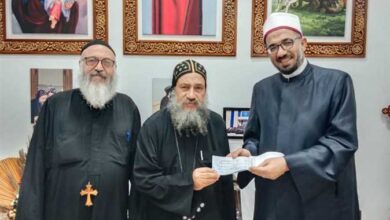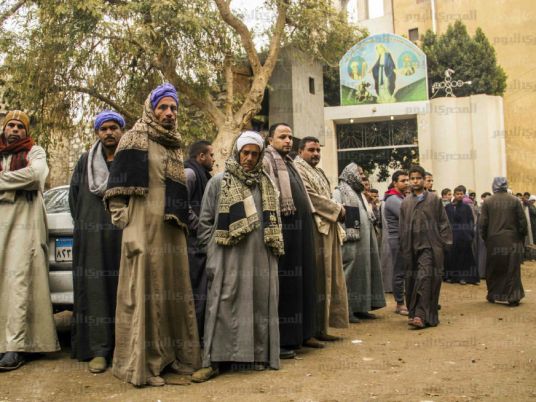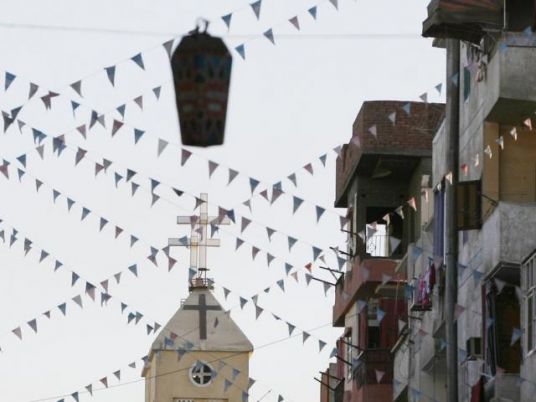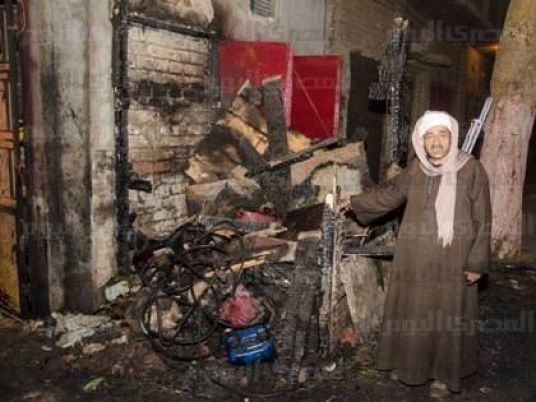William Wissa is an Egyptian journalist and rights activist currently living in Paris. Although he lives abroad, Wissa follows issues in Egypt closely, particularly the Coptic file, a subject on which he has written a book.
Al-Masry Al-Youm spoke to Wissa about sectarian tension in Egypt, alleged discrimination against members of the local Coptic community and the 6 January Naga Hammadi slayings.
Al-Masry Al-Youm: As a media expert that has worked at a number of major French and European media outlets, what do you think of the Egyptian media’s take on the Jan. 6 Naga Hammadi shootings ?
William Wissa: State media, which is actually a publicity tool in the hands of the regime, is used to violating the most basic professional rules when covering news about crimes against Copts in particular. On the first day following the shootings, all national papers described the crime as an "individual incident," then later as a "criminal act"–even though all the factors constituting a terrorist act were present. The incident targeted Copts who were gathering for [Coptic] Christmas. All news agencies said the incident was of a terrorist and sectarian nature.
State media also uses double standards. While it described the killing of an Egyptian soldier on the border with Gaza as a "massacre" and "crime" and allocated the headlines of the their front pages to the incident, the killing of the seven Egyptians–most of whom were Copts–in Naga Hammadi was merely described as a "sad incident."
See also how the killing of Marwa el-Sherbiny occupied the front pages–in what seemed like hysteria–for weeks on end. Germany was accused of racism; the West of loathing Arabs and Muslims; and the German Judiciary of bias. But when it came to the Naga Hammadi incident–which took place right here in Egypt and not in Germany–Egyptian mass media, especially state-run outlets, handled the incident–especially on the first day–as they would the fall of a bus into a canal.
But private media outlets seemed to sense the gravity of the crime, as I noticed a qualitative change in their analysis. I generally feel that Egyptian media have for decades played a role in creating such an antagonistic atmosphere against Copts because of the blackout they imposes on the Coptic file.
Al-Masry: What comments do you have on assertions by both the Interior Minister and the media linking the earlier incident in Farshout, in which a Coptic man was found guilty of raping a Muslim girl, to what happened in Naga Hammadi?
Wissa: Everybody depended on the Interior Ministry statement which linked the rape of a girl in Farshout to the massacre in Naga Hammadi. If a terrorist organization was announcing its responsibility for an incident, then it wouldn’t say anything more than what the minister’s statement did. It said the shootings in Naga Hammadi were in revenge for what happened in Farshout, as though this provided justification for the hideous crime.
I was bemused to hear the attorney-general say on one private television channel that there might be a link between what happened in Farshout and the incidents in Naga Hammadi even before the launch of investigations. Besides, a position like his requires that he be very reserved. His position was not understandable, since there’s a legal principle that says that an accused person is innocent until proven guilty.
Al-Masry: It was said there was negligence on the part of security forces. What do you think?
Wissa: In my view, this is the crime of an entire regime, which has destroyed components of the state. Crimes against Copts involve all institutions of the state. The crimes that occur could not have been perpetrated by some thug or person with a criminal record who has no political or religious activity as was reiterated by the media.
If we go back ten years, we will find the same scenario has been repeated. The El-Kosheh incident was an even more grisly crime than that of Naga Hammdi, in which 21 people were killed. Before that, there was the crime of Abu Qorqas in 1997, when terrorists shot at church visitors, killing 13 people. No verdicts were passed against the killers. It’s more like negligence on the part of the state as a whole.
Security forces tend to arrive late to the scene of the crime, when the criminals have already carried out their crime. Besides, when MP Georgette Qellini said something that the other MPs didn’t like, they tried to stop her from speaking–one MP even described her as a "criminal."
So I say those are crimes perpetrated by the state. If such events had taken taken place in a democratic country, the entire regime would have collapsed.
Al-Masry: Copts in Naga Hammadi protested in the streets following the funerals and destroyed some shop facades. Some 5000 people also demonstrated at the monastery. Do you think this is a new phenomenon that could have a dangerous side to it?
Wissa: The protest of 3000 Copts in Naga Hammadi following the massacre and the demonstration of another 5000 following the weekly sermon by the pope show that Coptic young people are beginning to feel disappointed at the failure of the state to protect them in their own country, and at the fact that criminals escape justice. In fact, those traditional "reconciliation sessions" imposed by the security apparatuses are a form of persecution of Copts. Such conditions can no longer continue.
I just hope the response won’t be violent. I call on Coptic young people to use legal and constitutional methods, and political rather than religious slogans based on equality and the Universal Declaration of Human Rights. They should call, along with other fellow citizens, for the respect of human rights for everyone.
Al-Masry: It is said that the leadership in Egypt is taking some steps in favor of Copts. What do you think of that?
Wissa: I’m afraid it’s too late, because many segments of society are already radical. This regime has proven that it can’t provide a solution for Copts and for all Egyptians. I don’t understand why Mubarak is silent about all these assaults. Following any assault, he suffices to make undeclared communications with church leaders, or puts the whole matter in the hands of the security apparatus.
In his first speech following the Naga Hammadi incident, Mubarak spoke about real estate tax and only generally about national unity. But when foreigners were the victims in the [1997] Luxor Temple incident, he visited the city himself and removed the minister of interior and several other security officials on the very same day. But when it comes to terrorist attacks that target his own people, he dispatches the minister of endowments or the minister of administrative development.
It seems like the regime can no longer control the situation. Isn’t there anyone wise to run this country? You can’t lead a country without a political vision, depending only on security forces and interfering in the course of justice. Today, corruption and chaos are the rule.
Al-Masry: Mostafa el-Fiqqi, head of the foreign affairs committee in the People’s Assembly, described the current era as a "Golden Era for Copts." What do you think?
Wissa: During the previous "Golden Era" of Sadat, Copts were vilified by preachers in mosques, and everybody seemed silent about it. In the current "Golden Era," preachers go as far as to incite action against Copts, such as attacking churches, just like what happened in Ain Shams and Dafsh Village in Minya, or attacking homes in which Copts pray.
I can tell you of many such incidents that occurred over the past years following Friday prayers. The church has sent Mubarak a CD with footage of such violent incidents. Even some senior officials order the demolition of service establishments that belong to the Coptic Church, like when the Governor of Qalubiya decided to demolish one such building, or when the Governor of Alexandria demolished a Coptic nursing home in King Mariut.
Even if those buildings were built in violation of rules, officials seem to only select church buildings to demolish. Whenever there’s an argument between a Christian and a Muslim, the Muslim neighbors will damage the homes of Copts who have nothing to do with the fight, like what happened in Esna, Fayoum and Farshout.
I challenge el-Fiqqi to tell me about a single verdict that favored Copts amid all these assaults against Copts. El-Feqqi doesn’t accept a Copt for president, saying that a Jew can’t become president of the US. So does he think that a Muslim can’t be ruled except by a Muslim?
Take Senegal as an example of a state with a Muslim majority that selected a Christian for the presidency. Leopold Senghor, the great poet, is a Chrisitan who led the country’s liberation movement and was the only president to refuse to stay in power longer than two terms. The Senegalese then chose two Muslims to succeed him in power within the framework of a democratic devolution of power.
Al-Masry: Why do you think Egypt still doesn’t have a unified law regulating the construction of places of worship?
Wissa: I believe the state fears a solution, as ever. Why is the state still hesitant after all these years? Is it scared of the response of the radical religious wave? I believe that the state doesn’t have the courage to issue that law.
Al-Masry: What is the future of expatriate Coptic organizations after the death of Adli Abadeer?
Wissa: Adli Abadeer helped achieve a quantum leap for the Coptic movement overseas. He was the first to bring together Coptic organizations in several back-to-back conferences. But unfortunately, a universal union of Coptic organizations was not formed.
But I believe the assaults against Copts and the failure of the current regime will necessarily lead to the unification of Copts here and abroad as Coptic youth feel increasingly alienated. In fact, I’ve seen some action inside Egypt that surpasses the capacities of activists abroad.
For example, there was a call for a comprehensive strike on New Years. Although the success of the strike cannot be measured because it fell on a Friday, it still scared Egyptian media and reflected the state’s fear of such initiatives.
Al-Masry: Do you approve of the idea of a quota for Copts in the People’s Assembly?
Wissa: The Egyptian Constitution approved this principle when it allocated a 50-percent quota to workers and farmers regardless of their competence. Gamal Abdel Nasser allocated ten seats to Copts, but that quota eventually became one in the hands of President Mubarak.
The problem is with the current political and cultural climate, where choice in the elections isn’t always based on democratic criteria–such as the competence of the candidate and his platform–but often instead depends on religious considerations. We’ve seen political, and not religious, waves adopt religious slogans during elections. There’s a problem with political awareness across various segments of the society, which has pushed Copts to abstain from participation in elections.
The quota system would thus help address the lack of genuine representation for Copts. We can use the quota system as a temporary solution, which is often referred to as positive discrimination in some democracies. If Copts are given a 10-percent quota in the People’s Assembly–equivalent to their percentage of the population–then they would have more than fifty seats. If anything, this only reflects how much discrimination Copts suffer.
I personally prefer a dual system that combines the proportional representation list system and the individual system. This will help minorities and independent candidates.
Al-Masry: What do you think of the swiss ban on minarets?
Wissa: First of all, there’s no comparison between the level of religious freedom here and that in Switzerland. Although we reject the ban, Muslims in Switzerland are still free to perform their rituals, whereas many Copts in Egypt cannot. Religious freedom in Egypt has been undermined, as many Copts cannot perform their rituals because places where Copts gather are attacked to prevent them from praying. And the state doesn’t officially denounce those assaults.
If that referendum was called in Egypt, what would its result be? I believe the overwhelming majority of Egyptians–not only 57 percent–would vote against the building of churches in the first place.
Didn’t the reconciliation session that followed incidents in Ayyat conclude that a church shouldn’t have "a dome or a cross," because Copts were trying to put up a cross and restore a dome? And that was long before the Swiss ban on minarets.
Al-Masry: What do you think of the barrier Egypt is building along its border with Gaza?
Wissa: Egypt has the right to adopt whatever procedures it deems necessary for the security of its land, if it’s true that weapons and drugs are being smuggled across the border.
Al-Masry: What do you think of ElBaradei’s conditions to run for the presidency?
Wissa: ElBaradei is an international figure, much respected in the world. As a man who understands democracy and human rights, it will be good to see him run for the presidency.
Translated from the Arabic Edition.




